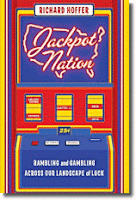Number One on his list:

Read about all five titles.The Malay Archipelago
By Alfred Russel Wallace
1869Alfred Russel Wallace sailed to what is today Indonesia in 1852, looking for the origin of species. Astonishingly, he found it, scribbling in a sort of fever dream the same theory that Darwin had been nursing for more than a decade. But Wallace, one of the 19th century's great field biologists, was also looking for the rare and beautiful bird of paradise, almost as if he sought the metaphorical antidote to the shattering theory he had just devised. His exquisite account of the Malay archipelago -- the natives, the animals, the birdlife, the topography -- makes his book a classic of scientific travel writing. Joseph Conrad kept it on his nightstand and drew on it for "Lord Jim," the story of a man who is himself seeking an island paradise to escape the burdens of his own history.
--Marshal Zeringue

























